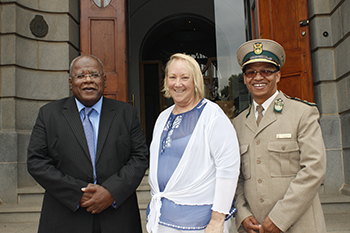Latest News Archive
Please select Category, Year, and then Month to display items
08 April 2021
|
Story Thabo Kessah
|
Photo UFS Photo Archive
 Dr KPD Maphalla with former UFS Chancellor, Dr Franklin Sonn, during the graduations in April 2007.
Dr KPD Maphalla with former UFS Chancellor, Dr Franklin Sonn, during the graduations in April 2007.
The University of the Free State is sad to learn of the passing of alumnus and award-winning Sesotho literary giant, Dr KPD Maphalla.
The literary works of Dr Khotso Pieter David Maphalla, like many other African writers and artists, were influenced and characterised by his own era of powerful forms of oppression and exclusion from dominant literary discourses. In his own right and through his writings of poetry, novels, short stories, and kodiamalla (dirge), he articulated a deliberate political and social protest and pushed for a place for African languages in literature at the height of apartheid.
“He entered the professional scene with his ground-breaking novel, Kabelwamanong, in 1982 at the age of 27. His career actually started in 1971 while he was still at school. Since his first novel, he has produced at least two books annually, covering the genres of poetry, novels, dramas, and short stories. As a dramatist, Dr Maphalla has written a number of excellent and educative radio dramas for the then Radio Sesotho (now Lesedi FM),” said his long-time friend and Head: African Languages at the University of the Free State, Dr Nyefolo Malete.
“It was for this writing prowess that he received recognition from the UFS when he was awarded an Honorary Doctorate in Literature by the Department of African Languages during a momentous ceremony on the Qwaqwa Campus in 2007,” added Dr Malete.
Dr Malete also revealed that, despite losing the use of his right hand after suffering a stroke following a car accident in the late 1990s, Dr Maphalla continued writing using his left hand. “He was adamant that, what he referred to as his ‘supposed disability’, would not deter his passion for writing.”
Dr Maphalla’s work has also produced numerous scholarly studies by the likes of Profs Moleleki Moleleki (protest poetry), Thapelo Selepe (lament and protest poetry), and Dr Seema Seema (process of cross-cultural communication). He was a committed Qwaqwa community member, who was also instrumental in the founding of Qwaqwa Community Radio (2000) and Metjodi Writers (2006), among others. He has written more than 70 books, many of which have been prescribed texts in schools.
Some of the awards he has won include:
South African Centre for Digital Language Resource (SADiLar) Sesotho Lexicographic Unit (Sesiu sa Sesotho) Lifetime Award for outstanding literary works and for promoting Sesotho literature (2019).
The Literature Festival and the University of the Free State Award for enormous contribution to Sesotho literature by a South African writer (2019).
Lifetime Achiever Award in Literature awarded by the Department of Arts and Culture (2005).
M-Net Book Prize for Sesotho poetry (2005). The first and thus far the only Sesotho author to have received this honour.
M-Net Book Prize for best novel (1996).
De Jager-HAUM Literary Award for his volume of short stories, Mohlomong Hosane (1993).
Thomas Mofolo Trophy for Best Novel, Best Poetry, and the Overall Award (1992).
Thomas Mofolo Trophy for Best Poetry (1991).
Dr JJ Moiloa Floating Trophy for Best Sesotho Poetry Book of the Year, Kgapa tsa ka (1985).
UFS Postgraduate student council’s community project a success
2016-03-03

Prof Jansen Vice-Chancellor and Rector, Dr Henriette van den Berg, Director of Postgraduate School, and Mr Gustav Wilson, Regional Head: Development and Care, Free State and Northern Cape Region. |
The University of the Free State’s Postgraduate Student Council embarked on a courageous community engagement project for Mandela Day in 2015. The programme was aimed at assisting offenders at Tswelopele Correctional Centre pass their matric exams, thus granting them access to tertiary education.
The Postgraduate Student Council assisted the 2015 matriculants with study support, and motivated them during their final examinations in 2015. The council will play a bigger role this year by offering offenders at Tswelopele career advice and career guidance for when they leave the correctional facility, as well as study techniques to assist them throughout the year, to ensure a 100% pass mark in 2016.
Offenders who had participated in the Postgraduate Student Council project attended the Postgraduate School’s Open Day on 19 February. Of the 12 offenders, 11 passed their matric exams, while one is currently busy with his supplementary exams. Tswelopele has a 92% pass rate; it is the best performing correctional centre in South Africa.
The Tswelopele Correctional Centre also serves as a full-time high school (Grade 10-12), and TVET College, assisting offenders to register for tertiary education through various universities.
Prof Jonathan Jansen, Vice-Chancellor and Rector of the University of the Free State, said that he was immensely proud of the matriculants from Tswelopele Correctional Centre. He added that it is vital for every human being to receive a second chance. “Rehabilitation programmes are meant to give offenders a second chance at life, because we cannot give up on humanity. Correctional centres and rehabilitation centres are a societal responsibility. Society must not give up on offenders, everyone deserves a second chance, and we cannot give up on humanity.”
“To our offenders going through rehabilitation and all our young people who are our hope for the future of our beloved country, be encouraged. Dream again. Discover the wonder in your lives,” said Mr Gustav Wilson, Regional Head: Development and Care, Free State and Northern Cape Region.